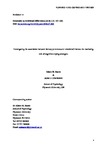Investigating the association between fantasy proneness and emotional distress: the mediating role of cognitive coping strategies
| dc.contributor.author | Bacon, Alison | |
| dc.contributor.author | Charlesford, JJ | |
| dc.date.accessioned | 2018-07-20T10:50:23Z | |
| dc.date.issued | 2018-12-01 | |
| dc.identifier.issn | 0191-8869 | |
| dc.identifier.uri | http://hdl.handle.net/10026.1/11861 | |
| dc.description.abstract |
Fantasy proneness (FP; the tendency to immersion in imagination) is linked to psychopathology and suggested to be a maladaptive coping strategy. However, some evidence suggests it can be a positive trait. We examined whether the FP-emotional distress relationship is mediated by coping strategy. Participants completed the Depression, Anxiety and Stress Scale, the Cognitive Emotion Regulation Questionnaire measure of coping strategies, the Creative Experiences Questionnaire FP scale (Study 1; N=248) and the newly developed Fantasy Questionnaire which measures fantasy across two subscales, creative and imaginative (Study 2; N=208). In Study 1, FP presented positive associations with emotional distress, with maladaptive coping strategies selfblame, rumination and catastrophizing, and with adaptive strategies positive refocussing, planning and positive reappraisal. Mediation indicated that self-blame and rumination partially accounted for the negative relationship between FP and distress, while positive refocussing ameliorated it. In Study 2, creative fantasy showed no relationship with distress, though imaginative fantasy was positively associated, with self-blame mediating the relationship. A tendency to fantasise can negatively influence psychological outcomes particularly in the presence of maladaptive coping. Our data support the suggestion that fantasy proneness is multi-componential and that not all aspects are linked to negative emotion. | |
| dc.format.extent | 157-165 | |
| dc.language | en | |
| dc.language.iso | en | |
| dc.publisher | Elsevier | |
| dc.subject | Fantasy proneness | |
| dc.subject | Coping | |
| dc.subject | Imaginitive fantasy | |
| dc.subject | Creative fantasy | |
| dc.subject | Depression | |
| dc.title | Investigating the association between fantasy proneness and emotional distress: the mediating role of cognitive coping strategies | |
| dc.type | journal-article | |
| dc.type | Journal Article | |
| plymouth.author-url | https://www.webofscience.com/api/gateway?GWVersion=2&SrcApp=PARTNER_APP&SrcAuth=LinksAMR&KeyUT=WOS:000446144900024&DestLinkType=FullRecord&DestApp=ALL_WOS&UsrCustomerID=11bb513d99f797142bcfeffcc58ea008 | |
| plymouth.volume | 135 | |
| plymouth.publication-status | Published | |
| plymouth.journal | Personality and Individual Differences | |
| dc.identifier.doi | 10.1016/j.paid.2018.07.00307.003 | |
| plymouth.organisational-group | /Plymouth | |
| plymouth.organisational-group | /Plymouth/Faculty of Health | |
| plymouth.organisational-group | /Plymouth/Faculty of Health/School of Psychology | |
| plymouth.organisational-group | /Plymouth/REF 2021 Researchers by UoA | |
| plymouth.organisational-group | /Plymouth/REF 2021 Researchers by UoA/UoA04 Psychology, Psychiatry and Neuroscience | |
| plymouth.organisational-group | /Plymouth/REF 2021 Researchers by UoA/UoA04 Psychology, Psychiatry and Neuroscience/UoA04 REF peer reviewers | |
| plymouth.organisational-group | /Plymouth/Research Groups | |
| plymouth.organisational-group | /Plymouth/Research Groups/Centre for Brain, Cognition and Behaviour (CBCB) | |
| plymouth.organisational-group | /Plymouth/Research Groups/Centre for Brain, Cognition and Behaviour (CBCB)/Behaviour | |
| plymouth.organisational-group | /Plymouth/Research Groups/Plymouth Institute of Health and Care Research (PIHR) | |
| plymouth.organisational-group | /Plymouth/Users by role | |
| plymouth.organisational-group | /Plymouth/Users by role/Academics | |
| dcterms.dateAccepted | 2018-07-04 | |
| dc.rights.embargodate | 2020-7-19 | |
| dc.rights.embargoperiod | Not known | |
| rioxxterms.versionofrecord | 10.1016/j.paid.2018.07.00307.003 | |
| rioxxterms.licenseref.uri | http://www.rioxx.net/licenses/all-rights-reserved | |
| rioxxterms.licenseref.startdate | 2018-12-01 | |
| rioxxterms.type | Journal Article/Review |


